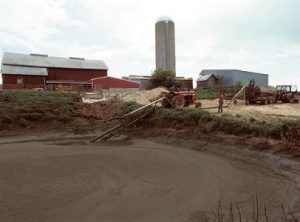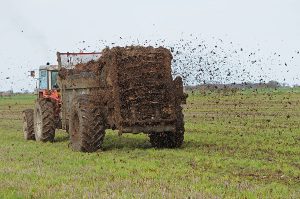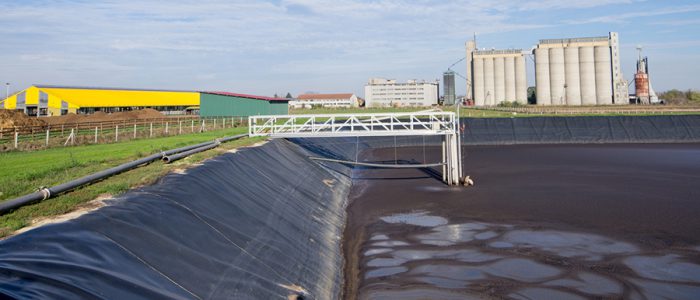MAY 2023
Manure is a valuable resource for crop production. However, as manure decomposes, invisible gases are released, which can be deadly. Hydrogen sulfide, or H2S, is particularly dangerous. In addition, there can be an increased release of such gasses during manure agitation. This is especially true when manure slurry contains sulfur compounds from gypsum bedding, poor water quality, or other sources.
Read on for information about work at Pennsylvania State University to increase awareness of these dangers and guidelines for preventing injury or death around manure storage.
 Extension experts release guidelines to increase safety of manure storage
Extension experts release guidelines to increase safety of manure storage
Alexandra McLaughlin, Pennsylvania State University
Republished from Pennsylvania State University with permission from Dr. Eileen Fabian, Professor of Agricultural Engineering and Environmental Biophysics in the Department of Agricultural and Biological Engineering. Read the original article.
UNIVERSITY PARK, PA — Farming is among the most dangerous work environments in the U.S., with higher fatality rates than emergency responders, according to the National Education Center for Agricultural Safety. Among the factors that contribute to farming’s risk profile is the potential presence of toxic gases associated with manure storage facilities.
In 2012, two young boys were knocked unconscious near their family’s dairy manure storage, prompting Penn State Extension to take action. To prevent future incidents during manure agitation, Extension formed a partnership with two companies and USDA’s Natural Resources Conservation Service, seeking to identify the cause of the accident and implement measures to avoid similar incidents. These efforts appear successful.
As manure storage emptying season approaches, Penn State researchers seek to reinforce the message that increased awareness of manure gas dangers saves lives.
In the year prior to the incident with the two boys, fatalities on other dairy farms occurred during manure agitation, which surprised researchers at Penn State, including Dr. Eileen Fabian, Professor of Agricultural Engineering and Environmental Biophysics in the Department of Agricultural and Biological Engineering. The manure storages were open-air and uncovered, which would seem to limit the risk of manure gas exposure compared to closed, covered or confined manure storages.
Demonstration trials at 10 dairy farms in 2014-15 showed that dangerous levels of hydrogen sulfide gas during manure agitation likely contributed to farm incidents and fatalities. This project revealed limited awareness among dairy farmers about the increased release of dangerous manure gas during agitation, particularly high levels of hydrogen sulfide gas due to sulfur compounds in manure slurry from gypsum bedding, poor water quality or other sources. The driving force behind much of this data collection was Michael Hile, who now directs the Penn State Odor Assessment Laboratory. His doctoral work in agricultural and biological engineering was instrumental in generating project results and informing extension efforts.

Hile and other experts in agricultural engineering, farm safety and air quality at Penn State collaborated to communicate the dangers of hydrogen sulfide gas released from liquid manure containing gypsum. Outreach products, for both local and national audiences, included field days, outreach to media, conference presentations, fact sheets and peer-reviewed journal articles.
Collaboration between academic, business and government entities was crucial to the success of the project, the researchers noted. Companies such as USA Gypsum and Industrial Scientific provided expertise and partial sponsorship, while the 10 dairy farms provided real-world insight. The involvement of these companies, along with the Natural Resources Conservation Service, allowed for wider dissemination of the project’s findings to the dairy industry.
National events for professional manure haulers provided venues to increase awareness of the dangers during agitation and promote the use of instrumentation. Laboratory trials revealed ways to lessen hydrogen sulfide release from manure containing gypsum, but at a higher cost. One gypsum bedding supplier currently recommends using modest levels of gypsum bedding in a mixture with conventional bedding. The Natural Resources Conservation Service quickly incorporated project findings in their bulletins and fact sheets, promoting safe manure storage and agitation practices.
In the long term, the project has led to heightened awareness of the dangers of sulfur in manure and the need for caution during agitation.
Although she can’t prove a connection, Fabian said she believes this project likely contributed to the lack of recent incidents during gypsum-manure agitation. “No additional deaths from gypsum-laced manure storage agitation have been recorded in Pennsylvania since the project’s findings were widely circulated,” she said.
Additional resources related to gypsum-bedding and manure-storage gas emissions are available on a Penn State Extension gypsum-bedding webpage.
 Additional Resources
Additional Resources
- Gypsum Bedding and Manure Storage Gas Emissions
Penn State Extension - Gypsum Bedding and Deadly Hydrogen Sulfide Gas
Penn State Extension - Farm Safety Check: Manure Management
UMASH

